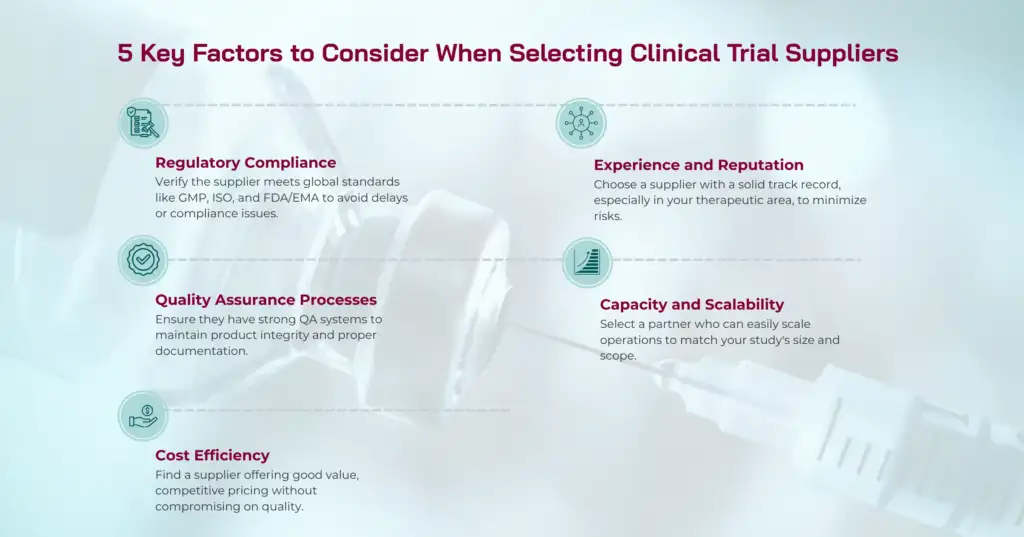Selecting the right clinical trial supplier is a crucial step that can make or break the success of your clinical research. In a competitive landscape with over 50,000 pharma and biotech firms globally, choosing a reliable partner for clinical trial supplies has never been more critical. This comprehensive guide sheds light on factors, processes, and best practices for choosing the right clinical trial supplier.
In the intricate world of clinical research, suppliers often operate behind the scenes yet play a significant role in determining trial outcomes. The clinical trial suppliers are the backbone of research success, responsible not only for providing essential supplies but also for managing logistics, compliance, and specialized services that keep trials running smoothly.
The increasing prevalence of chronic diseases drives the growing demand for high-quality clinical trial supplies. And the competitive nature of the pharmaceutical industry is also responsible for increasing its demand. As researchers navigate this complex ecosystem, the ability to choose the right clinical trial suppliers becomes paramount in achieving research goals. Achieving research goals while balancing regulatory compliance and cost efficiency can be daunting but with a strategic approach, selecting the right clinical trial supplier becomes manageable and impactful.
Clinical Trial Suppliers and Their Importance
Clinical trial suppliers encompass a diverse group of organizations that provide essential materials, services, and support required for successful medical investigations. These varied organizations include pharmaceutical companies, contract research organizations (CROs), logistics providers, and specialized clinical trial supply management companies.
The clinical trial suppliers directly impact the quality, efficiency, and compliance of research studies. These partners ensure investigators have access to necessary resources, right from the start of the studies. They ensure the proper management of investigational drugs, medical devices, laboratory supplies, and data management systems.
Their role extends beyond just provision to offering comprehensive clinical trial supply services such as:
- Regulatory compliance and audit readiness
- Quality assurance and inventory control
- Cold chain and temperature-sensitive logistics
- Real-time tracking and traceability technologies
- End-to-end visibility across the pharma supply chain
Selection of trustworthy suppliers is a critical consideration for researchers worldwide. So, to simplify this, we have mentioned the 5 crucial factors to consider when selecting a clinical trial supplier.
5 Factors to Consider When Selecting Clinical Trial Suppliers

1. Regulatory Compliance
The foremost consideration when choosing a clinical trial supplier is ensuring strict adherence to regulatory guidelines. Suppliers must demonstrate compliance with Good Manufacturing Practices (GMP), International Organization for Standardization (ISO) certifications, and relevant FDA/EMA guidelines.
2. Experience and Reputation
Evaluating a supplier’s track record in supplying clinical trial products provides valuable insights into their reliability and expertise. Suppliers with extensive experience of over a decade in the field can more effectively navigate the complexities of clinical studies and anticipate potential challenges.
3. Quality Assurance Processes
Examine the supplier’s quality control procedures to ensure the integrity and reliability of clinical trial supplies throughout the trial. This includes robust track and trace technologies, documentation practices, and continuous monitoring systems that maintain product quality from manufacturing to delivery.
4. Capacity and Scalability
Assess whether potential clinical trial suppliers can meet your study’s volume and timing requirements. This includes evaluating their ability to scale operations up or down based on trial needs and their capacity to handle multiple studies simultaneously without compromising quality.
5. Cost Efficiency
While competitive pricing is essential, it should never compromise quality. The goal is to strike an optimal balance between cost-effectiveness and the quality of clinical trial supply services provided.
Ensuring Timely Delivery of Clinical Trial Supplies
Efficient logistics and transportation are fundamental to successful clinical trial supply management. The healthcare research logistics market size was valued at USD 88.04 billion in 2023 and is expected to reach USD 192.81 billion by 2032, highlighting the increasing importance of timely delivery.
Key strategies for ensuring reliable delivery include:
- Selecting Experienced Logistics Partners: Choose transportation providers with proven expertise in handling clinical research materials
- Implementing Contingency Planning: Develop backup plans for potential delays, including alternative routes and emergency suppliers
- Real-time Tracking Systems: Utilize advanced monitoring technologies to track shipments and enable proactive issue resolution
- Temperature Control: Ensure proper cold chain management for temperature-sensitive materials
- Documentation Management: Prepare all necessary shipping and regulatory paperwork in advance to prevent customs delays
Best Practices to Consider When Selecting a Clinical Trial Supplier
Choosing the right clinical trial supplier is critical to the success of your study. To ensure reliability, compliance, and operational excellence, consider the following best practices when evaluating potential partners:
Quality Management Systems (QMS)
Ensure the supplier has a robust QMS in place, covering every aspect of the supply chain—from sourcing and manufacturing to storage and final delivery. Their quality protocols should align with global regulatory standards and support seamless audit readiness.
Risk Management Capabilities
Evaluate how the supplier handles risk. A reliable partner should proactively identify potential supply chain disruptions and have well-defined mitigation strategies to ensure continuity of supply and protect trial timelines.
Transparent Stakeholder Communication
Choose a supplier that prioritizes clear and consistent communication with all stakeholders, including sponsors, CROs, regulatory authorities, and clinical sites. Effective collaboration and information sharing reduce delays and misunderstandings.
Strong Documentation Practices
Thorough documentation is essential for regulatory compliance. Look for a supplier with a proven track record in maintaining complete, accurate, and timely records that meet global regulatory and audit requirements.
By focusing on these criteria, sponsors can confidently select a clinical trial supplier that not only meets operational needs but also supports long-term trial success.
Future Trends for Selecting a Clinical Trial Supplier
Embracing Digital Supply Chain Capabilities
Evaluate suppliers offering real-time tracking, automated inventory systems, and enhanced supply visibility.
Leveraging AI and Predictive Analytics
Choose partners who use artificial intelligence in clinical trial supply chain management to forecast demand, manage inventory, and reduce supply risks.
Prioritizing Traceability with Blockchain
Look for suppliers implementing blockchain for secure, transparent, and auditable supply chain records.
Supporting Decentralized Trials with Telehealth Integration
Opt for suppliers experienced in telehealth logistics to support remote monitoring and patient-centered services.
Focusing on Patient-Centric Supply Models
Select vendors aligned with modern and patient-centric trial designs—offering flexibility, home delivery, and improved compliance tools.
Conclusion
Choosing the right clinical trials suppliers is a multifaceted process that requires careful consideration of regulatory compliance, experience, quality assurance, and logistical capabilities. As the clinical research evolves, successful partnerships with reliable clinical trial supply service providers become increasingly crucial for achieving research objectives.
Digital transformation, sustainability initiatives, and patient-centric innovations will shape the future of clinical trial sourcing. By implementing the strategies and best practices outlined in this guide, researchers can build robust supplier networks.
At Spring Bio Solution, we are committed to providing strategic, compliant, and patient-centric clinical trial supply solutions tailored to your trial needs. Contact us to ensure seamless sourcing, regulatory assurance, and dependable delivery—every step of the way.
FAQs
What makes a clinical trial supplier compliant with regulatory standards?
A compliant clinical trial supplier adheres to industry regulations such as Good Manufacturing Practices (GMP), ISO certifications, and relevant FDA or EMA guidelines. They also maintain robust documentation, support audit readiness, and follow strict quality and safety protocols throughout the supply chain.
What is the clinical trial supply chain?
The clinical trial supply chain is the complete process of getting investigational drugs and materials from the manufacturer to the clinical sites or patients. This includes manufacturing, packaging, labeling, storing, and distributing trial materials—all while meeting strict regulatory and temperature-control requirements.
What does the vendor selection process involve in clinical trials?
Vendor selection in clinical trials means identifying and evaluating third-party partners who can provide the needed services or products for a study. The selection is based on factors like their experience, service quality, cost, regulatory compliance, and ability to meet timelines.
What’s the difference between a vendor and a supplier in clinical trials?
A supplier provides clinical trial supplies, such as drugs, lab kits, or packaging materials used in the trial. A vendor, on the other hand, often provides services, such as logistics support, patient engagement, or data analysis.





